 7/5/2010 - AHF moderates Capitol Hill seminar on energy security, helps draft Policy Paper. The policy seminar, "Coercion in the European Energy Sector: Implications for the United States," was held in the Congressional Meeting Room of the Capitol Visitor Center on June 24, 2010 and sponsored by the Central and East European Coalition (CEEC) in cooperation with the Congressional Caucus on Central and Eastern Europe. 7/5/2010 - AHF moderates Capitol Hill seminar on energy security, helps draft Policy Paper. The policy seminar, "Coercion in the European Energy Sector: Implications for the United States," was held in the Congressional Meeting Room of the Capitol Visitor Center on June 24, 2010 and sponsored by the Central and East European Coalition (CEEC) in cooperation with the Congressional Caucus on Central and Eastern Europe.
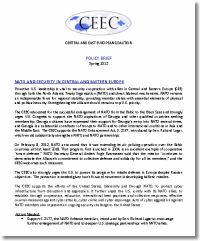 |
The AHF Statement is available for download: English  |
The seminar focused on how the lack of a unified European energy policy promotes division and coercion vis-a-vis the use specific energy reserves,
especially in Central and Eastern Europe and the implications for U.S. security and foreign policy.
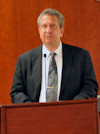 The Federation is an active member of the CEEC, which comprises 18 national grassroots organizations. The distinguished panelists included The Honorable Keith C. Smith, Professor Mamuka Tsereteli and The Honorable Franklin D. Kramer. Karl Altau of the Joint Baltic National Committee gave the opening remarks. Frank Koszorús, Jr., National President of the Federation, served as the Moderator of the seminar. Marju Rink-Abel of the Estonian American National Council gave the closing remarks. Among the attendees were Congressional staff, members of the diplomatic corps, CEEC representatives and members of the Federation. The Federation is an active member of the CEEC, which comprises 18 national grassroots organizations. The distinguished panelists included The Honorable Keith C. Smith, Professor Mamuka Tsereteli and The Honorable Franklin D. Kramer. Karl Altau of the Joint Baltic National Committee gave the opening remarks. Frank Koszorús, Jr., National President of the Federation, served as the Moderator of the seminar. Marju Rink-Abel of the Estonian American National Council gave the closing remarks. Among the attendees were Congressional staff, members of the diplomatic corps, CEEC representatives and members of the Federation.
Panelist 1 – Keith Smith
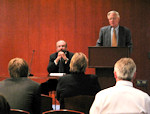 The danger to the CEE countries and the challenge to American policy is not the extent to which East and Central European countries are dependent on Russia’s energy sources. Even though a feeling of coercion comes from the fact that Russia turns off or has threatened to turn off energy sources for political reasons, the danger is not necessarily the dependency. The danger to the CEE countries and the challenge to American policy is not the extent to which East and Central European countries are dependent on Russia’s energy sources. Even though a feeling of coercion comes from the fact that Russia turns off or has threatened to turn off energy sources for political reasons, the danger is not necessarily the dependency.- Corruption is a growing factor. It is a challenge to the Europeans more than to the United States, considering the dependency of European and American political elites on non-transparent financial transactions and the outright corruption that has affected policy-making.
- Most non-transparent energy companies operate in remote places. Some of the Gazprom companies are located in Switzerland not in Moscow. And there is also a lot of non-transparency in Cyprus, Liechtenstein and other off-shore areas where these companies operate.
- We should stop ignoring these politically-motivated energy disruptions in Eastern Europe. The acceptance by the Europeans of the EU monopoly situation, where the only company that can export oil into the EU is Russian, and the only company that can export gas is also Russian (both run by the state) - increases Russia’s bargaining power with each individual European country. This kind of “Divide and Conquer” policy run by Putin / Medvedev has created many “rigged deals” behind the scenes – as recently occurred with the new government in Croatia.
- These transactions led to the possibility that the alternative pipelines in CEE countries from the Adriatic Sea would be controlled by the Russian government.
- The monopoly of Gazprom is costly to the Europeans. Something needs to be done about that. Although there have been some pushes in Europe, they are still not enough because big companies in Europe benefit greatly from this monopoly situation. These companies, such as ones in Germany and France, work out the special deals behind the scenes.
- The danger to the United States is Europe’s willingness to overlook potentially harmful elements in Russia’s international policy and transatlantic security as a result of increasing energy dependency. Over the last few years, companies and political leaders in Germany and Italy have become more dependent on Russian supply contracts, questionable business deals, and a tendency to “gloss over” the corruption in Russian energy trade.
- It is in U.S. interests to have these energy companies be more transparent and to adopt legislation which would allow the public to know the sources of their funding, operations, etc. This should be a matter of public knowledge.
Panelist 2 – Mamuka Tsereteli
 It is essential for us to understand how the strategy of Russian companies is working and the key elements that Gazprom – the monopoly energy exporter- utilizes. One objective factor is Infrastructure – natural gas supply pipelines in the CEE countries are all coming from Russia; no new major infrastructure was developed since the collapse of the USSR. It is essential for us to understand how the strategy of Russian companies is working and the key elements that Gazprom – the monopoly energy exporter- utilizes. One objective factor is Infrastructure – natural gas supply pipelines in the CEE countries are all coming from Russia; no new major infrastructure was developed since the collapse of the USSR.- The second factor is the fact that the Russian government and Gazprom in concert have political control over some distribution companies. Monopoly over the distribution companies allows Gazprom to eliminate other suppliers from entering the European market. The use of corruption to advance this strategy is particularly worrisome.
- So what can be done? Having in mind long term estimates for natural gas demand in Europe and declining domestic production, export dependency will most probably grow, and if there is no proactive European and U.S. policy towards this issue, there will be even more energy coming to the European market solely from Russia.
- In an effort to diversify natural gas suppliers and delivery routes for Europe, a substantial role can be played by the so called Southern Corridor and suppliers like Iraq, Central Asia, the Caspian Sea region, and potentially Iran, under the right political circumstances. In fact, there are several major infrastructure projects that are currently under discussion. For example, the Nabucco project that connects a pipeline from Turkey to Austria passing through Bulgaria, Romania, and Hungary, or an Italy-Greece-Turkey Interconnector, planning to use Caspian natural gas.
- However, there are two major reasons that have prevented development of new supply routes and sources of natural gas for Europe so far.
- One is the lack of infrastructure. There are no major pipelines that connect all natural gas fields from the Middle East or Caspian to Europe.
- In order to develop pipeline projects/ build infrastructure, the most important factor is financing that is based on long-term demand. It is thus essential to attract commercial participants or public funding into these multi-billion development projects. At this point, there is no clear commercial viability for infrastructure development, and no clear public funding commitment as well.
- What could make commercial players invest money in pipeline development? One of the key factors is the commitment of European countries/consumers to purchase a substantial amount of natural gas for the committed number of years. This would create a steady and predictable demand and encourage the commercial players to invest in infrastructure projects. We currently do not have these coordinated efforts.
- In the late 1990s, the United States implemented the proactive Multiple Pipeline Strategy, which supported pipeline development projects in the Caspian region and connected producer countries to major markets in the Black Sea and Mediterranean. This strategy engaged all the players: producers, transit countries, the energy industry, and organized public support for the projects that created conditions for long-term success.
- However, we have not seen a clear strategy / policy and coordinated effort like that in recent years. The United States needs to be more proactive to support those pipeline projects that could really solve the problem of energy security in the CEE region. Based on the current divide between Eastern and Western Europe in terms of the perceptions of threats from Russia and strategic priorities, it will be difficult to move forward without clear leadership.
Panelist 3 – Franklin Kramer
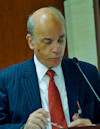 Mr. Kramer shared insights from the U.S.- European Union dialogue on sustainable energy security: ensuring physical security of supply, environmental responsibility and economic prosperity in Central Europe. The focus of the sessions was on Central European countries, the United States, and the EU (or Track 1.5 dialogue). Participants came from the U.S. Department of Energy, the EU (secretary level), international energy agencies, officials from the Czech Republic, Hungary, Slovakia, an NGO from Poland, and energy companies. Mr. Kramer shared insights from the U.S.- European Union dialogue on sustainable energy security: ensuring physical security of supply, environmental responsibility and economic prosperity in Central Europe. The focus of the sessions was on Central European countries, the United States, and the EU (or Track 1.5 dialogue). Participants came from the U.S. Department of Energy, the EU (secretary level), international energy agencies, officials from the Czech Republic, Hungary, Slovakia, an NGO from Poland, and energy companies. - There was a lot of discussion about what these countries could do for themselves and how they have to operate within the framework of the EU and more importantly, on how the Central and East European countries will fit in the EU’s energy strategy.
- The discussion also pointed out that gas is only a part of the energy strategy. Participating countries should be encouraged to look for alternative sources of energy that these countries have -- for example, Poland has significant coal resources -- and to discuss ideas of how those alternative sources could be utilized.
- As shale gas has become an increasingly more important source of natural gas in the United States over the past decade, the issue of the possibility for Europe to use its own resources of shale gas was also raised.
- Mr. Kramer shared some thoughts about how these countries might think about how they could create a coordinated strategy and then be a part of the U.S. strategy. The governments of the CEE countries should work together and cooperate under concerted group efforts such as the “Central European Energy Group.” Mr. Kramer also referred to the “58=58” equation (raised by an official from the Czech government) in which France and Germany together have 58 votes versus 58 combined votes of Poland, the Czech Republic, Slovakia, and Hungary in the EU. The equation suggests that the CEE countries as a block could have substantial vote leverage and influence on decisions being tried to push through for the EU by France and Germany.
- He also encouraged the CEE countries to consider various aspects of what they can do within the European Union energy strategy requirements. For example, one of the issues that the EU is promoting is the clean-energy approach. At the same time, most CEE countries are not “well-positioned” for this type of energy.
- Another aspect in which the EU is very interested is energy efficiency; the CEE countries should try to work on this issue.
- A further question is how would the CEE countries benefit from the “U.S.- EU energy council?”
- The United States should support the CEE countries in developing technical plans, working on the issues of energy efficiency, pipeline development, connectors, storage, etc. With the help of the United States, there are “a lot of things that can be done.”
PANEL BIOGRAPHIES
Ambassador Keith Smith is currently a senior associate in the CSIS Energy and National Security Program. He retired from the U.S. Department of State in 2000, where his career focused primarily on European affairs. From 1997 to 2000, he was U.S. ambassador to Lithuania, with additional posts in Europe, including Hungary (twice), Norway, and Estonia. From 2000 to the present, Smith has been a consultant to several energy companies and has lectured on Russian-European energy issues in the United States, Poland, Belgium, Norway, United Kingdom, Germany, Czech Republic, Estonia, and Lithuania. He is frequently quoted in the international media.
The Honorable Franklin Kramer is a national security and international affairs expert, and has multiple appointments, including as a Vice Chairman of the Atlantic Council of the United States. Mr. Kramer has been a senior political appointee in two administrations, including as Assistant Secretary of Defense for International Security Affairs for President Clinton, Secretary Perry and Secretary Cohen; and, previously, as Principal Deputy Assistant Secretary of Defense for International Security Affairs.
Dr. Mamuka Tsereteli is the President of Georgian Association in United States and a Professor at the School of International Service at American University in Washington D.C. He teaches classes on energy security for Europe and Central Eurasia and has extensive personal experience of working on energy strategies with international organizations, energy companies, other private industries, think-tank community and U.S. Government representatives.
Special thanks to Dr. Imre Namath for photos.
[< Back to CEEC news]
[< Back to all AHF news]
Join and Support Us Online!

[<< Back to All AHF News]
| [<< Back to all CEEC News]
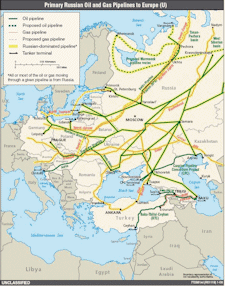
Russian Oil and Gas Pipelines to Europe.
[Download] the CEEC Statement 
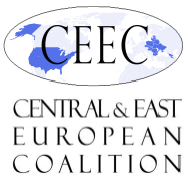
CEEC member organizations:
American Hungarian Federation
American Latvian Association
Armenian Assembly of America
Belarusan-American Association
Bulgarian Institute for Research and Analysis
Congress of Romanian Americans
Washington Chapter, Czechoslovak National Council of America
Estonian American National Council
Georgian Association in the USA
Hungarian American Coalition
Joint Baltic American National Committee
Lithuanian American Council
Lithuanian American Community
National Federation of American Hungarians
Polish American Congress
Slovak League of America
Ukrainian Congress Committee of America
Ukrainian National Association
____________
1612 K Street, NW, Suite 410
Washington, D.C. 20006
www.CEECoalition.org
Related Articles

10/10/2013 - Central Europe is a ready market for U.S. gas - by Anita Orbán and Vacláv Bartuska
While U.S. officials ponder their approach to Syria, the larger Middle East and Central Asia, they need look no farther than Central Europe and the “Visegrád Four” (Hungary, Poland, the Czech Republic and Slovakia) to find some of the United States’ most passionate allies. Our countries’ commitment to the transatlantic relationship is unwavering. But we remain vulnerable to “energy diplomacy” because of our overwhelming reliance on Russian gas and oil. [read more]
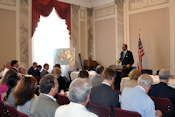 8/3/2011 -- The American Hungarian Federation and the Central and East European Coalition participate in a reception and Capitol Hill Policy Seminar entitled, "20 years: Three Perspectives on the Evolution of U.S. Strategic Engagement with Central and Eastern Europe." The purpose of the forum was to discuss Central and Eastern Europe (CEE) and American foreign policy toward that region. The forum brought together two panels consisting of leading authorities on issues of concern to the United States and CEE. Moderated by AHF President Frank Koszorus, Jr. [read more] 8/3/2011 -- The American Hungarian Federation and the Central and East European Coalition participate in a reception and Capitol Hill Policy Seminar entitled, "20 years: Three Perspectives on the Evolution of U.S. Strategic Engagement with Central and Eastern Europe." The purpose of the forum was to discuss Central and Eastern Europe (CEE) and American foreign policy toward that region. The forum brought together two panels consisting of leading authorities on issues of concern to the United States and CEE. Moderated by AHF President Frank Koszorus, Jr. [read more]
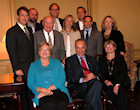 7/25/2008 - American Hungarian Federation Participates in CEEC Meeting with Senator Schumer: Discusses Russia "Hegemony" statement... The American Hungarian Federation and other members of the Central East European Coalition (CEEC) met with Senator Charles Schumer (D–NY) this week. The purpose of the meeting was to seek clarification of statements contained in Senator Schumer’s June 3rd Wall Street Journal article that were susceptible to the interpretation that he condoned Russian designs on Central and Eastern Europe. 7/25/2008 - American Hungarian Federation Participates in CEEC Meeting with Senator Schumer: Discusses Russia "Hegemony" statement... The American Hungarian Federation and other members of the Central East European Coalition (CEEC) met with Senator Charles Schumer (D–NY) this week. The purpose of the meeting was to seek clarification of statements contained in Senator Schumer’s June 3rd Wall Street Journal article that were susceptible to the interpretation that he condoned Russian designs on Central and Eastern Europe.
Downloads on NATO
 Most of these are .PDF files. If you do not have the free Adobe Reader, click the icon. Most of these are .PDF files. If you do not have the free Adobe Reader, click the icon.
- April 29, 2003 - US Senate Testimony: "NATO Enlargement: Promoting Western Values, Strengthening the Alliance." Calling attention to minority protections. before the United States Senate Committee on Foreign Relations.
- March 25, 2009 - US Senate Reception on the Occasion of the Policy Reception in Honor of NATO and Its Enlargement - : Remarks of Frank Koszorus, Jr.
- April 2009 - CEEC statement on NATO Enlargement and Supporting the Open Door Policy.
- July 2007 - Hungary's Accession to NATO: An expanded report by Frank Koszorus, Jr.
- October - November 1997: The Debate on NATO Enlargement:
Hearings Before the U.S. Senate Committee on Foreign Relations. Testimony of Frank Koszorus, Jr., President, AHFDC. An interesting exchange with Sen. John Kerry.
- June 20, 1996 - U.S. Policy Toward NATO Enlargement: Hearing before the Committee on International Relations,
United States House of Representatives 104th Congress, Second Session: Testimony of Frank Koszorus, Jr., President, AHFDC.
- June 2007 - Hudson Institute Panel: Enduring Strains of Communism
in Central and Eastern Europe
- March 29, 2004 - On the Occasion of NATO Expansion, Corcoran Gallery of Art. AHF Remarks by Frank Koszorus, Jr.: NATO
Enlargement and Minority Rights
- October 24, 2003 - AHF Memorandum on Romanian President Iliescu Visit
|



